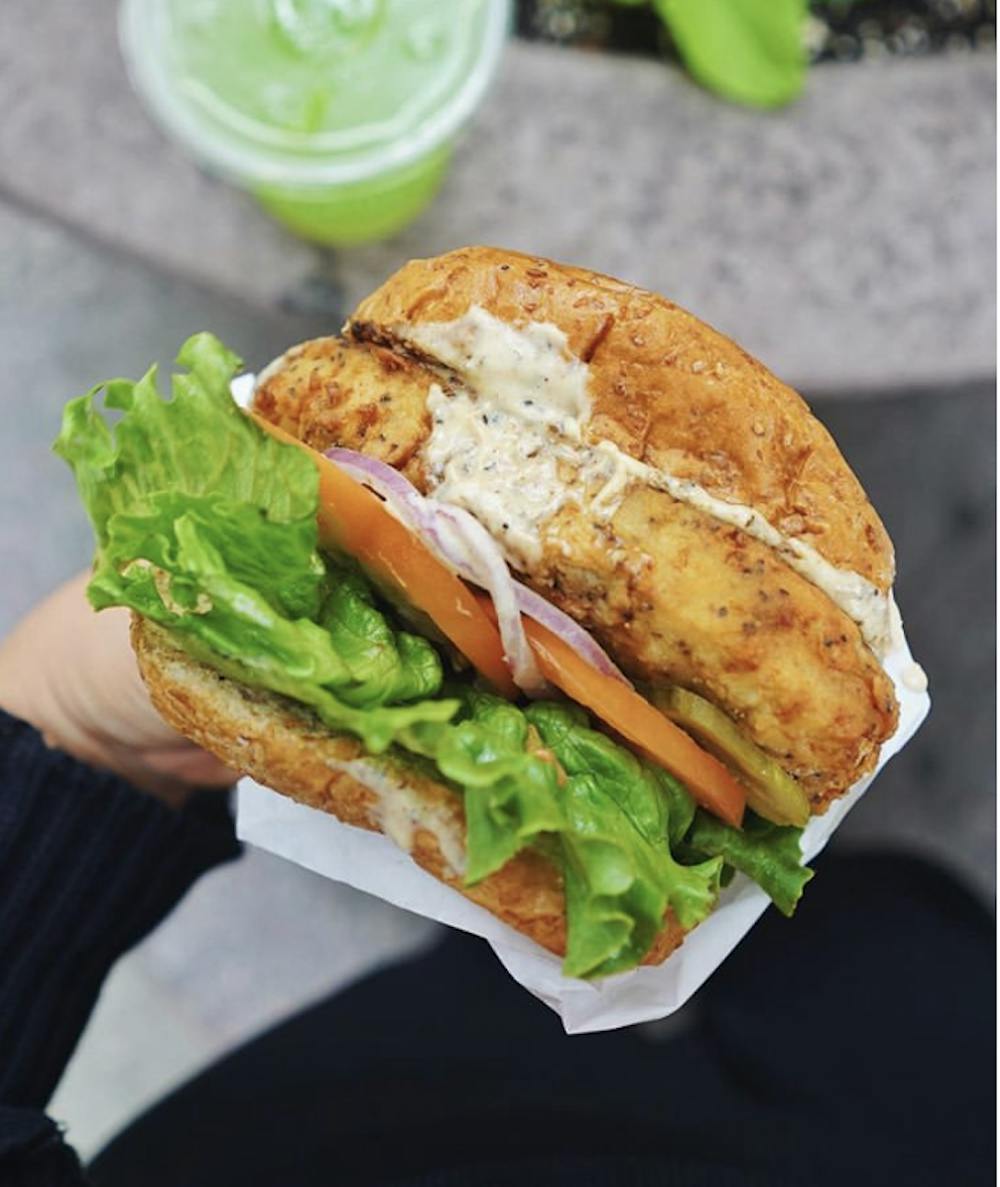Climate change is a big and looming issue, but it doesn’t have to be so intimidating. The (Com)Post is The Eagle’s new sustainability series that breaks down topics in eco-friendly living in a fresh, actionable and fun way.
The rise of sustainable fast casual restaurants are paving the way in a high-waste industry through composting, recycling and sourcing initiatives.
Most fast casual eateries aim to bring tasty, customizable and often healthier food to people in a way that’s faster and more affordable compared to a regular dine-in restaurant. With the District being the birthplace of some of the nation’s biggest fast casual food chains—think Cava, Sweetgreen and District Taco—there’s no doubt that the fast casual food scene is booming.
To accommodate high customer volume and demand for take out items, many fast casual restaurants use disposable containers and accumulate extraordinary amounts of waste. In recent years, a growing consumer demand for social and environmental responsibility has led some companies to commit to a new model: sustainable fast casual. Here are some spots around town that have committed to sustainability.
HipCityVeg
From its ingredients, to its waste management, to the restaurant space itself, HipCityVeg is committed to sustainability. The Philadelphia-based chain is dedicated to sourcing local ingredients when possible, and all of its food packaging is made from corn, which makes it entirely compostable. At the end of the day, the restaurant takes its food scraps and composts what it can and recycles what it can’t. The restaurant’s interior is designed with salvaged wood, recycled plastic and energy efficient lights and appliances. AU students can also receive 10 percent off their HipCityVeg order with their student IDs and mentioning the “fresh” discount.
Food type: Vegan burgers, salads, frozen treats
Nearest Location: 712 7th Street NW
Metro: Take the red line to Gallery Place
Sweetgreen
From sourcing local ingredients to implementing 100 percent compostable items such as straws, bowls, forks and more, Sweetgreen is a leader in fast casual sustainability. The chain is committed to reducing its carbon footprint, with all of its 75 locations having compost services and pickup. The chain also diverts about 60 percent of its waste from landfills and composts 75 percent of its food scraps.
Food type: Make-your-own salads
Nearest Location: 2200 Wisconsin Ave NW
Metro: Take the N6 bus towards Farragut Square
Chaia
A Georgetown gem, Chaia is a “farm to taco” fast casual eatery known for its fresh, locally sourced veggie tacos. In addition to the restaurant’s commitment to buying ingredients from local and sustainable sources, Chaia also has a “dedicated composting program to reduce its packaging impact.” All of Chaia’s packaging and serviceware are compostable and customers are asked to not bring any outside trash into the restaurant. Composting bins are placed by the doors for customers to toss their scraps on their way out.
Food type: Veggie tacos
Location: 3207 Grace St NW
Metro: Take the 33 bus towards Georgetown
Shake Shack
Known for its unique restaurant designs, Instagrammable crinkle fries and delicious grass-fed hamburgers, Shake Shack is one of the fastest growing fast casual chains in the U.S. and internationally. Many may be surprised to learn the company is also committed to “stand for something good” in its ingredients, communities and through sustainability. Shake Shack establishments composts kitchen scraps when locally available, and all of the 215 Shake Shack’s recycles all bottles and plastics. In fact, it collects and sorts 100 percent of bottles, cardboard, plastics and cooking oil to make sure no recyclables end up in landfills.
Shake Shack’s paper disposables (like the ones fries and burgers are placed in) are made from eco-friendly Sustainable Forestry Initiative-certified paper and printed with soy ink (rather than chemical ink dyes). Plus, 1 percent of all SHACK2O water bottle proceeds “supports the Waterkeeper Alliance and the cleanup of water sources around the globe.” Shake Shack also reuses its cooking oils to produce clean energy.
Food Type: Burgers, Fries, Shakes
Nearest Location: 1216 18th Street NW (SW corner of Connecticut)
Metro: Take the red line to Dupont Circle
Little Sesame
Little Sesame does fast casual a bit differently. The brainchild of two acclaimed chefs, the restaurant is committed to making authentic, bold Mediterranean flavors available at affordable prices. Although Little Sesame is a fast casual restaurant, it still encourages guests to eat in store by providing dining bowls and utensils. This works to “slow down” the fast casual eating experience, while also cutting down on packaging waste.
Little Sesame also sources local ingredients and supports “farmers doing things the right way.” It is also launching an annual fellowship program to invest in expanding good agricultural practices. Several members on the panel that judge the fellowship applicants work in sustainable agriculture. Although Little Sesame does not have the breadth and scope of Sweetgreen or Shake Shack, they are just as committed to sustainability.
Food Type: Mediterranean hummus and pita sandwiches
Nearest Location: 1828 L St NW
Metro: Take the red line to Farragut North
While these restaurants have made great efforts towards going green, they still depend on similar efforts from their customers. Many of these restaurants offer to-go items in compostable materials, and it will only be effective if they are placed in compost designated bins. If taking to-go, make sure you do your part and use the orange composting bins on campus to dispose of the containers.





